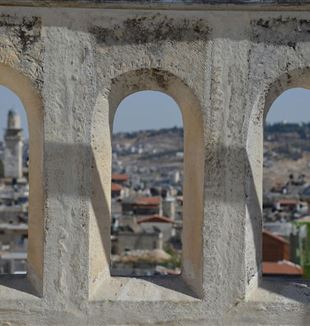
Bethlehem: A path that continues
Rafiq Nahra, patriarchal vicar for Israel in Nazareth, led the movement's Beginning Day in the Holy Land. In in Arabic for the first timeIn early September, I went to see Monsignor Rafiq Nahra, Patriarchal Vicar for Israel in Nazareth, to invite him to the Beginning Day in the Holy Land. After telling him about what we have experienced this year and what emerged at the International Assembly of Responsibles, we started working together on the path proposed by the movement. Each time we spoke he was very happy with the text we have been working on.
On Friday, September 27, there were about 20 of us in Bethlehem, and it was a real celebration. It was nice to gather together to begin again– although the situation has become more complicated even in the north – with the awareness that our happiness comes from the path that has been proposed to us.
The bishop made the four points his own. He began by saying that, as he did not know us very well, he had looked for videos of Fr. Giussani on YouTube, and he had been particularly struck by the answer Giussani gave at the 1983 Rimini Meeting to the question, “Why do they wait for you so much?” “Because I believe in what I say.” Monsignor Nahra emphasized how, for him, that phrase also meant that “I say what I believe in and that takes courage.”
He explained that God sent Christ to call each one of us into a personal relationship, but within a communion. It is a call that does not spoil our plans, but changes them for something good, makes them more fruitful, called, that is, sent. But to understand this it takes communion, to have a hundredfold of the things given to us (he was talking about God's promise to Abraham). He went on to say that Jesus called the disciples – just like us – to be with Him and sent them to preach. Being called, that is, sent in communion, is the sign of a healthy Christian life. However, to understand these things, we must surrender ourselves to Him; the whole of life is a school of “surrender,” up to and including total surrender in death, the ultimate encounter with the Lord.
He then came to the last point: building the Church in the Holy Land today. And he emphasized four points, following the path described earlier:
1. A prophetic gaze: looking at things as God looks at them.
2. Moving away from hatred and revenge by seeking dialogue: we must dialogue and not negotiate; dialogue is a sign of esteem for the other.
3. Do not be individualistic, but live in communion.
4. Be religious, but not extremist, at the risk of shutting ourselves off.
It was a great lesson, and the novelty was that the whole gesture was in Arabic for the first time. It has been my dream since I came back here.
As we were chatting at the table in the evening, the bishop looked at me with eyes full of wonder and said, “What a beautiful dinner!” I am very happy and grateful, we have a new friend and the friendship between us is growing. In fact, there were four new friends with us. This is what Lina wrote on the WhatsApp group the next morning: “Last night's meeting reminded me of the happiness we experienced together last year in Abu Ghosh for the Beginning Day. Yesterday we shared the 'treasure' that had been given to us. Our friendship is a clear sign of Christ's presence here and now. I sent some photos to a friend and she said, ‘Either you are crazy or Jesus can be the true hope and friendship of our life. Surely you agree with me that Jesus is the true hope and friendship of our life.”
Hussam, Haifa, Israel